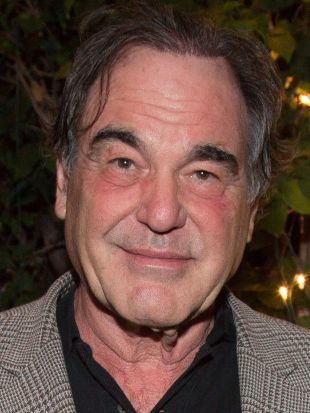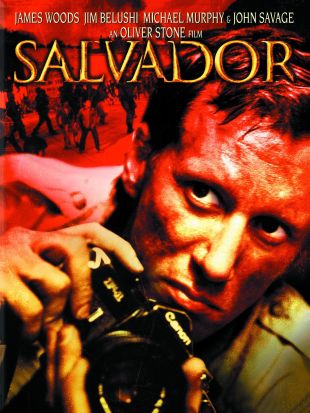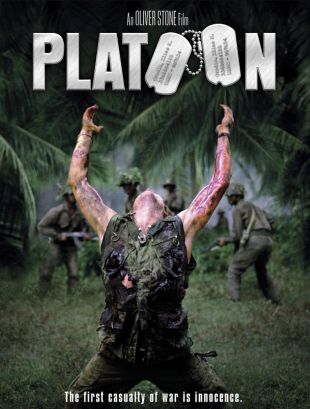Undoubtedly one of the most controversial directors in Hollywood, Oliver Stone has made films that are remarkable for both the way in which their subject matter is handled and the degree of controversy such handling inspires. Although he has served as a producer, screenwriter, and actor on a variety of films, Stone is consistently identified with his more political works, from 1986's Platoon, the first of his so-called Vietnam trilogy, to Nixon, his 1995 take on the finer points and parables of the Nixon administration. Despite this association with political films, Stone has stated that he considers his films "first and foremost to be dramas about individuals in personal struggles," and that he believes himself to be a dramatist rather than a political filmmaker.
Born in New York City on September 15, 1946, Stone grew up nurturing his love of films. He was particularly inspired by Luis Buñuel and Jean-Luc Godard, whose Breathless inspired the nascent filmmaker with its speed and energy. After a year at Yale, Stone dropped out and moved to Vietnam, where he taught English for a year. A year in Mexico followed, during which he wrote an unpublished novel and got arrested for marijuana possession. In 1967, Stone, like thousands of other men during that decade, enlisted in the military and went to Vietnam, where he received both a Bronze Star and Purple Heart during his year of service.
Upon his return from Vietnam, Stone enrolled at New York University, where he studied filmmaking under Martin Scorsese. As a student of Scorsese's, he participated in his first film project, Street Scenes 1970, a collection of student films on which Stone acted as a cinematographer. Four years later, he directed his first feature, Seizure, for which he also acted as editor and screenwriter. The film's overriding theme of psychological trauma proved to be good preparation for Stone's next project, the 1978 film Midnight Express. For his work as the film's screenwriter, he won his first Academy Award, for Best Adapted Screenplay.
After making his directorial debut for a major studio (Orion) with 1981's The Hand (a production for which he also served as screenwriter and had a minor acting role), Stone wrote a number of films, including 1982's Conan the Barbarian, Scarface (1983), and Michael Cimino's Year of the Dragon (1985). In 1986 Stone had his directorial breakthrough, with his internationally acclaimed Platoon. The film won him his first Best Director Oscar (as well as a slew of other awards, including the Oscar for Best Picture) and become the third-highest grossing film of 1986, as it redefined the way in which the Vietnam War was portrayed on film. Stone effectively opened the way for a new -- albeit controversial -- approach to looking at the war, and in so doing, his name became almost irretrievably associated with films of a more political, revisionist nature.
Stone's next directorial effort, the same year's Salvador, fully embraced the political tilt that Platoon had hinted at. The story of American photojournalist Richard Boyle (James Woods), Salvador explored the various politics at play during the early-'80s war in Central America. The film won widespread praise, and Stone, who was also its producer and screenwriter, followed it up with a similarly acclaimed effort, Wall Street (1987). A tale of greed, corruption, and power, the film reflected the American state of mind in the 1980s. It went on to win a Best Actor Oscar for star Michael Douglas, who supplied a chilling portrayal of the film's central source of sleaze, Gordon Gekko.
After completing 1988's Talk Radio, which was adapted from its star Eric Bogosian's stage production, Stone went on to make the second installment of his Vietnam trilogy, Born on the Fourth of July (1989). The film received a large dose of enthusiastic acclaim and a second Best Director Oscar for Stone, as well as seven other nominations, including Best Picture and Best Actor for Tom Cruise. But it marked the beginning of the criticism that was aimed at the director for certain aspects of his historic portrayals, including his tendency to make his protagonists into Christ-like figures (with Platoon's Chris Taylor being an earlier example of this).
Two years later, Stone directed two markedly divergent features, The Doors and JFK. The former was a drug-saturated biopic of singer Jim Morrison, while the latter presented Stone's conspiracy-theory approach to the assassination of John F. Kennedy. JFK incurred a lion's share of controversy for its heated subject matter, but it nevertheless secured eight Oscar nominations, including Best Director for Stone.
In 1993, Stone completed his Vietnam trilogy with Heaven and Earth. Unlike the trilogy's previous installments, Heaven and Earth looked at the war through the eyes of a Vietnamese woman, Le Ly Hayslip (from whose autobiographical writings the film was adapted). The film failed to find favor at the box office and the general indifference which greeted it proved inversely proportional to the brouhaha surrounding Stone's next directorial effort, 1994's Natural Born Killers. This story of serial killers (played by Woody Harrelson and Juliette Lewis) was celebrated by those who saw it as a condemnation of the media's glorification of violence and decried by those who claimed it did little more than glorify the very violence it purported to condemn.
The following year, Stone managed to regain some favor with Nixon, an epic take on the title character's presidency. Scoring four Oscar nominations but no wins, Nixon was Stone's last directing project until 1997, when he made U-Turn. Garnering little more than lukewarm critical and box-office response, the noirish comedy quickly disappeared. Stone spent the next couple of years as a producer of Savior (1998) and executive producer of Assassinated: The Last Days of King and Kennedy, but in 1999 he again took a seat in the director's chair with Any Given Sunday, a football movie starring Al Pacino, Cameron Diaz, and repeated collaborator James Woods. The same year, the director made the news for a less favorable accomplishment: a June arrest for drunk driving and possession of hashish.
Moving back into the political arena with his next film, Stone took to Cuba for the Fidel Castro documentary Comandante in 2003. Despite the fact that critical consensus ultimately decried Stone's exclusion of any truly pressing issues, the film nevertheless painted an one of the most intimate portraits of the Cuban leader to date. After documenting the current state of the Palestinain conflict in the same year's Persona Non Grata, Stone traveled back in time to study yet another great conflict with his Alexander the Great war drama Alexander in 2004. Even with an all-star cast that included Colin Farrell, Jared Leto, Anthony Hopkins and Angelina Jolie, audiences and critics were left cold and the film met an ignominious fate. Never shying away from controversial topics, Stone's follow-up was World Trade Center, a docu-drama about two firemen who were on duty and trapped in the rubble on September 11, 2001. In 2008 the director turned his attentions toward the White House for the political biopic W., which starred Oscar-nominated actor Josh Brolin as 43rd American President George W. Bush, and the following year he put U.S. foreign policy under the microscope in South of the Border -- an unabashedly biased documentary that found Stone on a road trip through numerous South American countries while speaking with a variety of leaders including Venezuela's Hugo Chávez, Cuba's Raúl Castro, and Paraguay's Fernando Lugo. 2010's Wall Street: Money Never Sleeps found Stone examining the roots of America's 2008 financial collapse with the first sequel of his long and varied career, but in 2012 the director took a break from reality for the ensemble crime thriller Savages. Based on author Don Winslow's novel of the same name, Savages told the tale of two peaceful Laguna Beach marijuana dealers who are targeted for extortion by the ruthless Mexican Baja cartel.



/_derived_jpg_q90_310x470_m0/ConantheBarbarian1982-PosterArt.jpg)